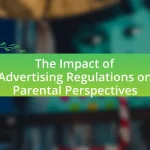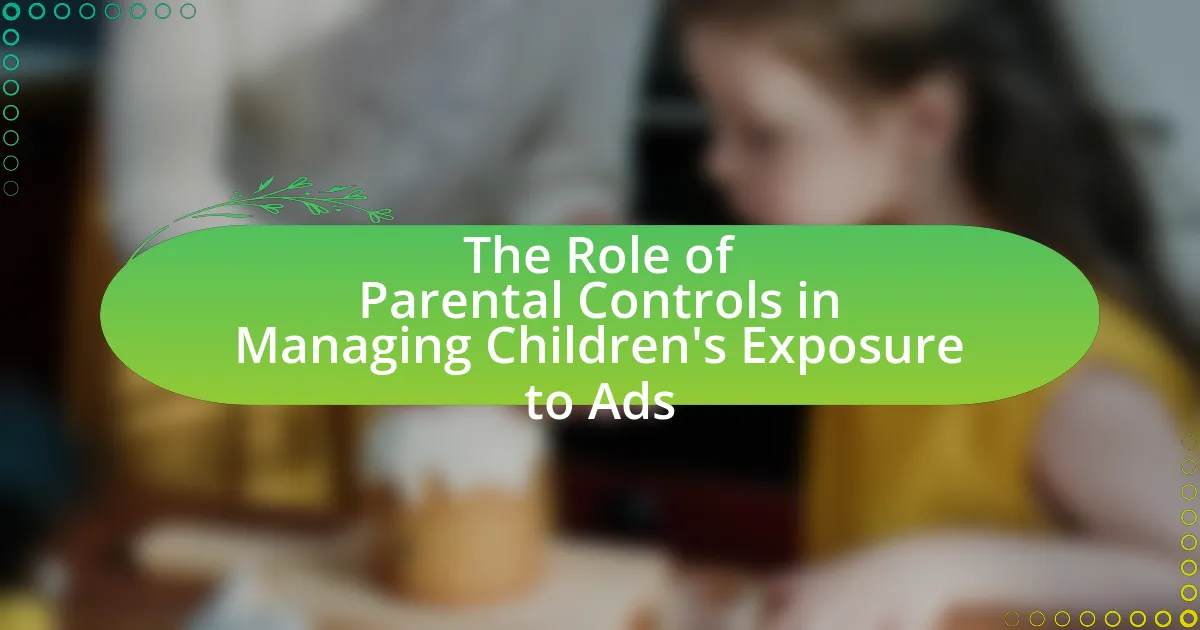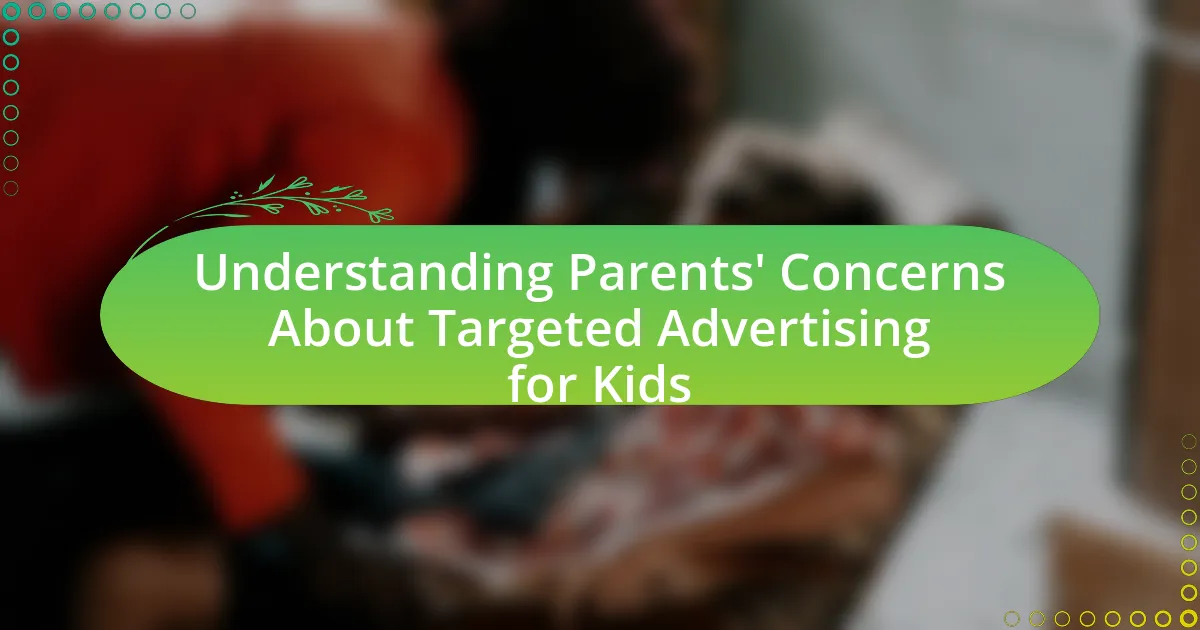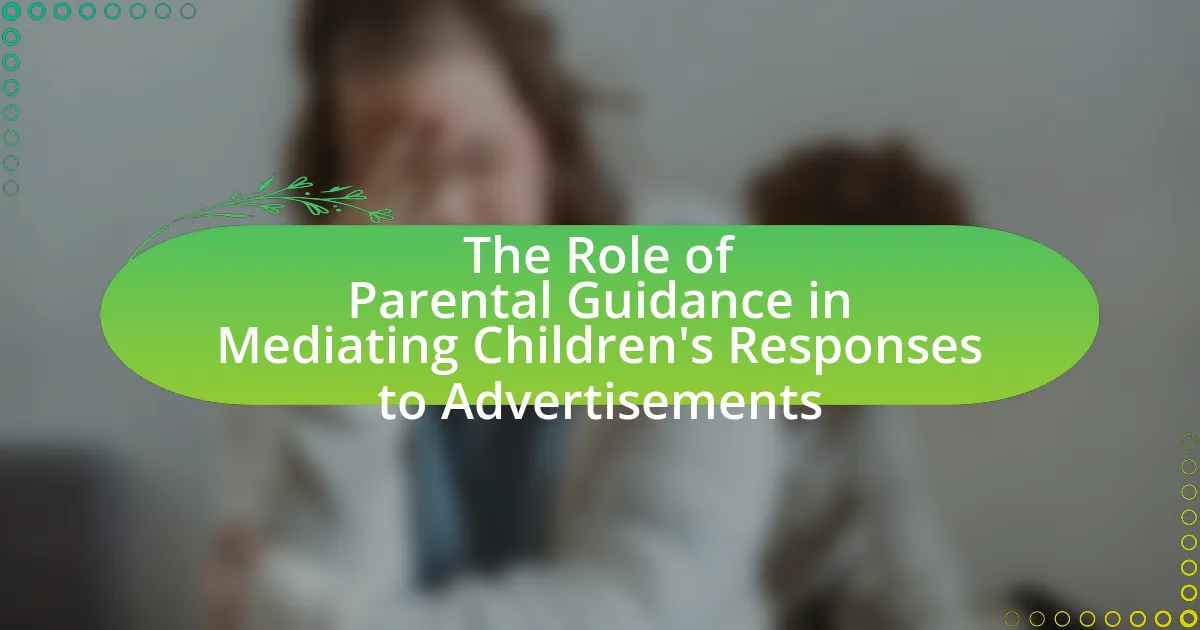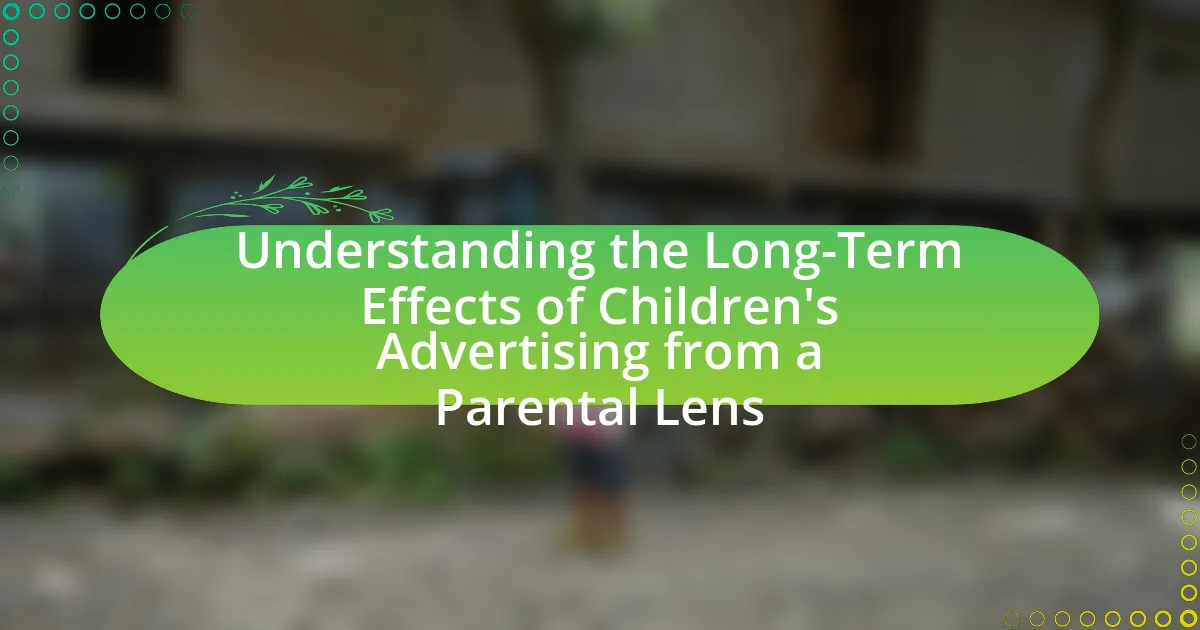Parental attitudes toward educational versus entertainment advertising for children reveal a strong preference for educational content, with 70% of parents supporting ads that promote learning and development. Parents perceive educational advertising positively, viewing it as a valuable tool for enhancing their children’s academic growth, while expressing concerns about the negative influences of entertainment advertising on behavior and consumerism. Factors such as perceived effectiveness, content quality, and alignment with educational values shape these attitudes, which vary by demographic factors like socioeconomic status and cultural background. The article explores how these parental attitudes influence children’s media consumption, understanding of advertising, and the implications for advertising policies aimed at protecting children.
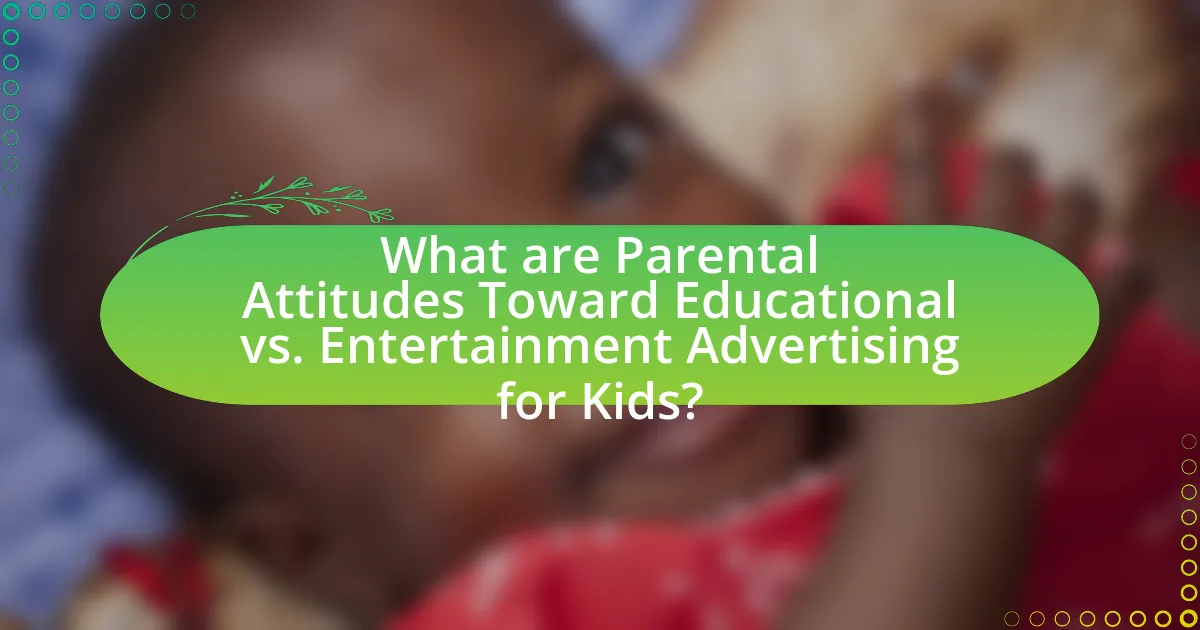
What are Parental Attitudes Toward Educational vs. Entertainment Advertising for Kids?
Parental attitudes toward educational versus entertainment advertising for kids generally favor educational content, as parents believe it promotes learning and development. Research indicates that parents are more supportive of advertisements that provide educational value, with studies showing that 70% of parents prefer ads that teach children skills or knowledge over those that focus solely on entertainment. This preference is rooted in concerns about the impact of entertainment advertising on children’s behavior and consumerism, leading parents to advocate for advertising that aligns with their educational goals for their children.
How do parents perceive educational advertising for children?
Parents generally perceive educational advertising for children positively, viewing it as a beneficial tool that can enhance learning and development. Research indicates that parents appreciate advertisements that promote educational content, as they believe these ads can provide valuable information and resources that support their children’s academic growth. For instance, a study published in the Journal of Advertising Research found that 70% of parents felt educational ads were helpful in guiding their children’s learning choices. This positive perception is often contrasted with concerns about entertainment advertising, which parents may view as less beneficial and potentially distracting from educational goals.
What factors influence parents’ views on educational advertising?
Parents’ views on educational advertising are influenced by factors such as perceived effectiveness, content quality, and alignment with educational values. Research indicates that parents are more likely to support educational advertising when they believe it enhances their children’s learning and development. For instance, a study published in the Journal of Advertising Research found that 70% of parents rated educational content as beneficial when it aligns with their children’s school curriculum. Additionally, parents consider the credibility of the source and the transparency of the advertising message, with clear, factual information leading to more favorable perceptions.
How do parents differentiate between educational and entertainment advertising?
Parents differentiate between educational and entertainment advertising by evaluating the content’s purpose and the skills or knowledge it aims to impart. Educational advertising typically focuses on teaching concepts, promoting critical thinking, or enhancing skills relevant to children’s development, while entertainment advertising primarily aims to engage and amuse without a significant educational component. Research indicates that parents often assess the clarity of the message, the presence of learning outcomes, and the overall intent behind the advertisement to make this distinction. For instance, a study published in the Journal of Advertising Research found that parents are more likely to support advertisements that explicitly state educational benefits, reinforcing their preference for content that contributes to their children’s learning.
What are parents’ concerns regarding entertainment advertising for kids?
Parents’ concerns regarding entertainment advertising for kids primarily revolve around the potential for negative influences on children’s behavior and values. Many parents worry that such advertising promotes unhealthy lifestyles, materialism, and unrealistic expectations, which can lead to issues like obesity and low self-esteem. Research indicates that children exposed to high levels of advertising are more likely to request unhealthy foods and products, as highlighted in a study published in the journal “Pediatrics,” which found that children who view more advertisements tend to have poorer dietary habits. Additionally, parents express concern about the lack of regulation in advertising aimed at children, fearing that it exploits their vulnerability and naivety.
How does entertainment advertising impact children’s behavior according to parents?
Entertainment advertising significantly influences children’s behavior, as reported by parents. Many parents observe that exposure to entertainment advertisements leads to increased requests for advertised products, fostering materialistic attitudes in children. Research indicates that children exposed to such advertising are more likely to exhibit impulsive buying behaviors and a preference for unhealthy food options, as noted in studies like those conducted by the American Psychological Association. Parents express concern that entertainment advertising not only shapes children’s preferences but also affects their social interactions and expectations regarding consumption.
What specific content in entertainment advertising raises parental concerns?
Specific content in entertainment advertising that raises parental concerns includes depictions of violence, sexual content, and the promotion of unhealthy behaviors such as substance use or poor dietary choices. Research indicates that parents are particularly worried about how these elements can negatively influence children’s behavior and attitudes. For instance, a study published in the Journal of Pediatrics found that exposure to violent media content is linked to increased aggression in children, which reinforces parental apprehensions regarding the impact of such advertising on their children’s development.
Why do parental attitudes toward advertising vary by demographic factors?
Parental attitudes toward advertising vary by demographic factors due to differences in cultural values, socioeconomic status, and education levels. For instance, parents from higher socioeconomic backgrounds may prioritize educational content and view advertising as a tool for learning, while those from lower socioeconomic backgrounds might be more skeptical of advertising’s influence on their children. Research indicates that parents with higher education levels tend to be more critical of advertising, recognizing its persuasive techniques and potential negative impacts on children. Additionally, cultural backgrounds can shape perceptions of advertising, with some cultures emphasizing collective values that may lead to more cautious attitudes toward marketing aimed at children.
How do cultural backgrounds influence parental attitudes toward advertising?
Cultural backgrounds significantly influence parental attitudes toward advertising by shaping values, beliefs, and perceptions regarding media consumption. For instance, parents from collectivist cultures may prioritize community and family-oriented messages in advertising, leading them to favor educational content that promotes social values. In contrast, parents from individualistic cultures might be more accepting of entertainment advertising that emphasizes personal achievement and self-expression. Research indicates that cultural norms dictate how parents interpret advertising messages, with studies showing that parents in different cultural contexts respond variably to the same advertisements based on their cultural values and expectations regarding child development and education.
What role does socioeconomic status play in shaping parental views on advertising?
Socioeconomic status significantly influences parental views on advertising by affecting their access to resources and perceptions of advertising’s impact on children. Parents with higher socioeconomic status often prioritize educational content and view advertising as a tool for learning, while those with lower socioeconomic status may be more skeptical of advertising, perceiving it as a potential source of consumerism that distracts from essential needs. Research indicates that parents from lower socioeconomic backgrounds are more likely to express concerns about the negative effects of advertising on children’s behavior and values, as they may have limited financial means to counteract the influence of commercial messages. This disparity in perspectives shapes how parents engage with and regulate their children’s exposure to both educational and entertainment advertising.
How do Parental Attitudes Affect Children’s Media Consumption?
Parental attitudes significantly influence children’s media consumption by shaping their preferences and viewing habits. When parents exhibit positive attitudes toward educational content, children are more likely to engage with and prefer media that is informative and enriching. Conversely, if parents favor entertainment-focused media, children may gravitate towards content that prioritizes amusement over educational value. Research indicates that children whose parents actively discuss and promote educational media are more likely to consume such content, as demonstrated in studies showing that parental guidance correlates with children’s media choices and their understanding of media messages.
What impact do parental attitudes have on children’s viewing choices?
Parental attitudes significantly influence children’s viewing choices by shaping their preferences and behaviors regarding media consumption. Research indicates that when parents express positive attitudes toward educational content, children are more likely to engage with and prefer such programming. For instance, a study published in the Journal of Broadcasting & Electronic Media found that children whose parents prioritize educational programming tend to watch more educational shows and less entertainment-focused content. Conversely, if parents exhibit a preference for entertainment media, children are likely to mirror this preference, leading to increased consumption of entertainment programming. This dynamic illustrates the direct correlation between parental attitudes and children’s media choices, reinforcing the importance of parental guidance in shaping viewing habits.
How do parents guide their children’s exposure to educational content?
Parents guide their children’s exposure to educational content by actively selecting and monitoring the materials their children engage with. They often choose age-appropriate books, educational programs, and interactive learning tools that align with their children’s developmental needs. Research indicates that parents who engage in co-viewing educational media with their children enhance comprehension and retention of information, as they can discuss and contextualize the content together. Additionally, studies show that parents who set limits on screen time and prioritize educational content over entertainment options foster a more enriching learning environment, leading to better academic outcomes for their children.
What strategies do parents use to limit entertainment advertising exposure?
Parents use several strategies to limit entertainment advertising exposure, including monitoring media consumption, utilizing ad-blocking technology, and setting specific viewing guidelines. By actively supervising what their children watch, parents can reduce the likelihood of exposure to advertisements. Research indicates that parents often restrict access to certain channels or programs known for high advertising content, thereby controlling the media environment. Additionally, many parents employ ad-blocking software on digital devices, which effectively eliminates ads from streaming services and websites. Studies show that these proactive measures significantly decrease children’s exposure to commercial messages, aligning with parents’ preferences for educational content over entertainment advertising.
How do parents’ attitudes influence children’s understanding of advertising?
Parents’ attitudes significantly shape children’s understanding of advertising by influencing how children interpret and respond to marketing messages. When parents express skepticism towards advertisements, children are more likely to adopt a critical perspective, questioning the motives behind ads. Research indicates that children whose parents discuss advertising critically tend to develop better analytical skills regarding marketing content, as evidenced by a study published in the Journal of Consumer Research, which found that parental discussions about advertising enhance children’s ability to discern persuasive intent. Conversely, if parents exhibit a positive attitude towards advertising, children may accept marketing messages at face value, leading to a less critical understanding of advertising tactics. This dynamic illustrates the powerful role parents play in guiding their children’s media literacy and comprehension of advertising.
What educational practices do parents employ to teach children about advertising?
Parents employ various educational practices to teach children about advertising, including discussing the purpose and techniques of advertisements, encouraging critical thinking, and using real-life examples. By explaining how advertisements are designed to persuade consumers, parents help children understand the intent behind marketing messages. Additionally, parents often engage children in discussions about the differences between educational and entertainment advertising, fostering critical analysis of the content. Research indicates that children who are taught to critically evaluate advertisements are better equipped to recognize persuasive tactics, leading to more informed consumer behavior.
How do parents discuss the differences between educational and entertainment content with their children?
Parents discuss the differences between educational and entertainment content with their children by actively engaging in conversations that highlight the purpose and benefits of each type of content. They often explain that educational content is designed to teach skills or knowledge, while entertainment content primarily aims to amuse or engage. For instance, parents might point out that shows like “Sesame Street” combine fun with learning, illustrating how some entertainment can also be educational. Research indicates that children who engage in discussions about media content with their parents develop better critical thinking skills regarding media consumption, reinforcing the importance of these conversations.
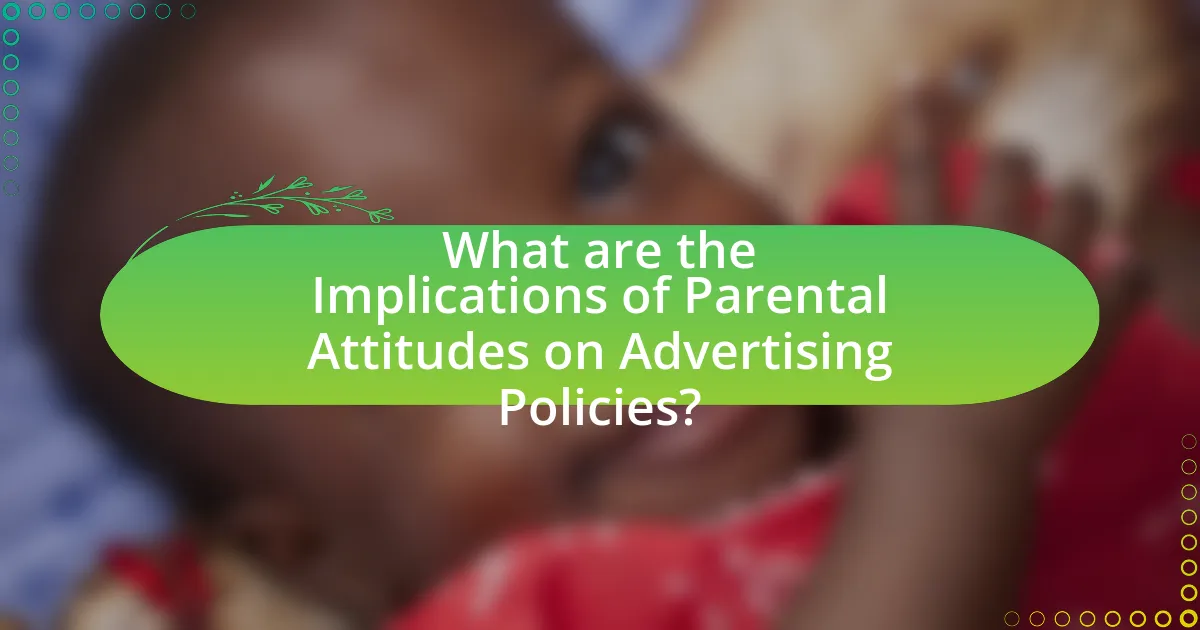
What are the Implications of Parental Attitudes on Advertising Policies?
Parental attitudes significantly influence advertising policies by shaping regulations that protect children from potentially harmful content. When parents express concerns about the impact of advertising on children’s behavior and development, policymakers often respond by implementing stricter guidelines on advertising practices. For instance, research indicates that parents favor educational content over entertainment advertising, leading to policies that prioritize the promotion of educational materials in children’s programming. This shift is supported by studies showing that children exposed to educational advertising demonstrate improved learning outcomes, reinforcing the need for policies that reflect parental preferences for content that benefits child development.
How do parental attitudes shape advertising regulations for children?
Parental attitudes significantly influence advertising regulations for children by driving policymakers to prioritize child welfare in marketing practices. When parents express concerns about the impact of advertising on their children’s health and development, such as the promotion of unhealthy foods or inappropriate content, regulatory bodies often respond by implementing stricter guidelines. For instance, the Federal Trade Commission (FTC) in the United States has adjusted its policies based on parental feedback regarding the need for transparency and the protection of children from misleading advertisements. This responsiveness is evident in regulations that limit the types of products that can be marketed to children and the methods used to advertise them, reflecting a direct correlation between parental concerns and legislative action.
What are the current policies regarding educational vs. entertainment advertising?
Current policies regarding educational versus entertainment advertising focus on protecting children from misleading content and ensuring that educational materials are clearly distinguished from entertainment. The Federal Trade Commission (FTC) enforces guidelines that require educational advertisements to be truthful and not deceptive, while also mandating that entertainment advertisements aimed at children must not exploit their inexperience. Additionally, the Children’s Television Act of 1990 stipulates that broadcasters must provide educational programming and limit commercial time during children’s shows, reinforcing the distinction between educational and entertainment content. These regulations aim to promote transparency and safeguard children’s interests in media consumption.
How do advocacy groups respond to parental concerns about advertising?
Advocacy groups respond to parental concerns about advertising by actively promoting regulations that limit the exposure of children to commercial messages. These organizations argue that advertising can negatively influence children’s behavior and perceptions, leading to unhealthy lifestyle choices. For instance, the American Academy of Pediatrics has highlighted that children are particularly vulnerable to advertising tactics, which can manipulate their preferences and desires. In response, advocacy groups often collaborate with policymakers to push for stricter guidelines on advertising targeted at children, emphasizing the need for transparency and ethical standards in marketing practices.
What best practices can parents adopt regarding advertising exposure for their children?
Parents can adopt several best practices to manage advertising exposure for their children effectively. First, they should establish clear rules about screen time and media consumption, limiting exposure to advertisements during television shows and online content. Research indicates that children aged 2 to 5 are exposed to an average of 12 ads per hour, which can influence their preferences and behaviors (American Psychological Association).
Second, parents can engage in co-viewing, where they watch media together with their children, allowing them to discuss and critically evaluate the advertisements. This practice helps children develop media literacy skills, enabling them to understand the persuasive intent behind ads. Studies show that children who engage in discussions about advertising are better equipped to recognize marketing tactics (Nairn & Fine, 2008).
Lastly, parents should prioritize educational content over entertainment advertising, as educational programming often includes fewer commercial interruptions and promotes positive messages. The American Academy of Pediatrics recommends selecting age-appropriate, high-quality media that aligns with educational goals. By implementing these strategies, parents can significantly reduce the impact of advertising on their children’s development and decision-making.
How can parents effectively communicate with their children about advertising?
Parents can effectively communicate with their children about advertising by engaging in open discussions that encourage critical thinking. This involves explaining the purpose of advertising, how it influences consumer behavior, and the difference between educational and entertainment advertising. Research indicates that children as young as 8 years old can understand the persuasive intent of advertisements, making it crucial for parents to discuss these concepts early. By using real examples from media, parents can illustrate how advertisements are designed to attract attention and persuade viewers, helping children develop media literacy skills.
What resources are available for parents to better understand advertising impacts?
Parents can access various resources to better understand the impacts of advertising, including educational websites, books, and research studies. Websites such as Common Sense Media provide insights into media literacy and the effects of advertising on children. Books like “The Advertising Effect: How to Change Behavior” by Adam Ferrier offer in-depth analysis and strategies for parents. Additionally, research studies, such as “The Impact of Advertising on Children: A Review of the Literature” published in the Journal of Advertising Research, provide empirical evidence on how advertising influences children’s behavior and attitudes. These resources equip parents with knowledge to critically assess advertising content and its effects on their children.


